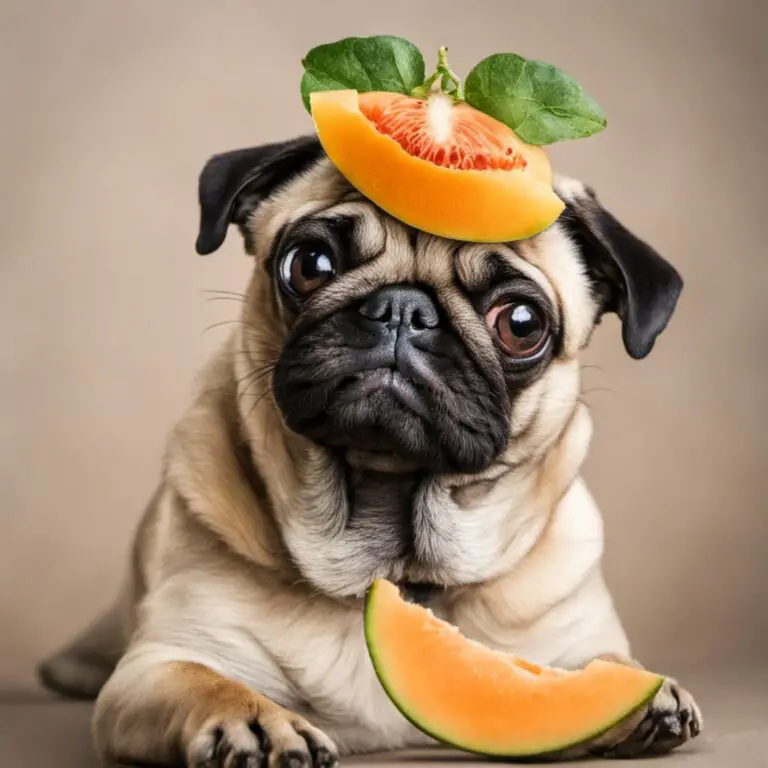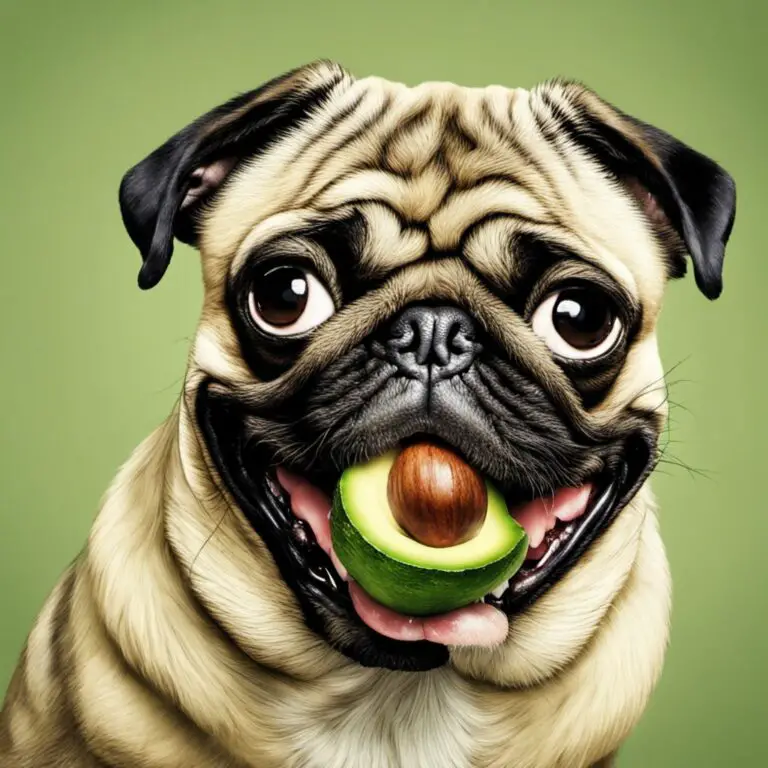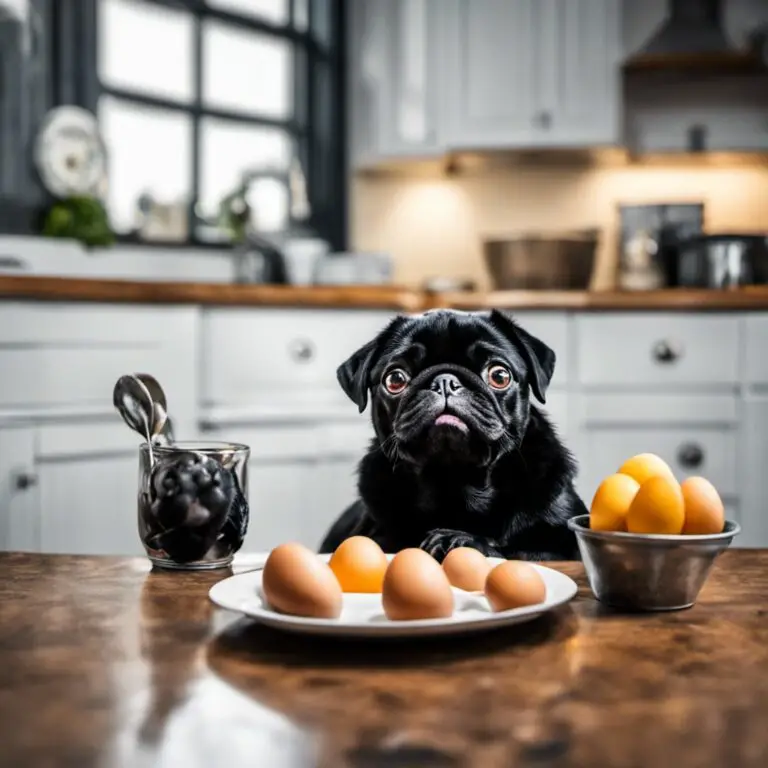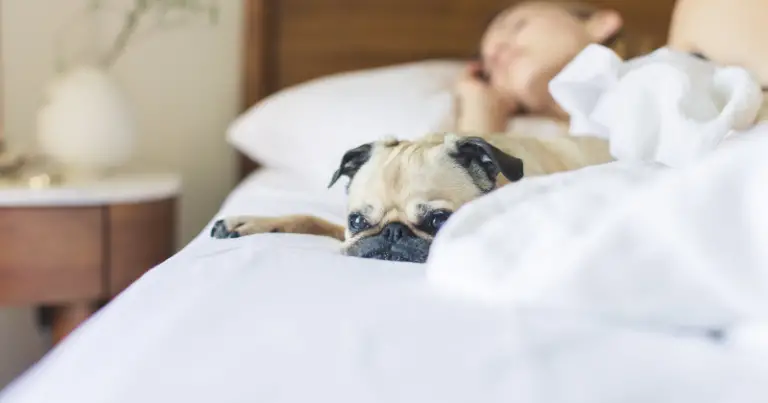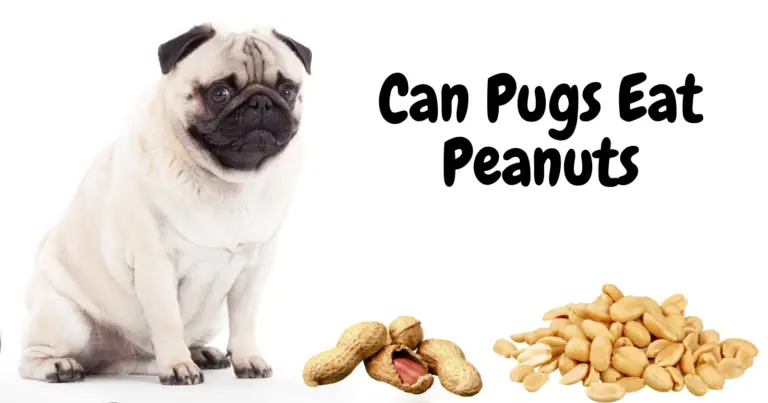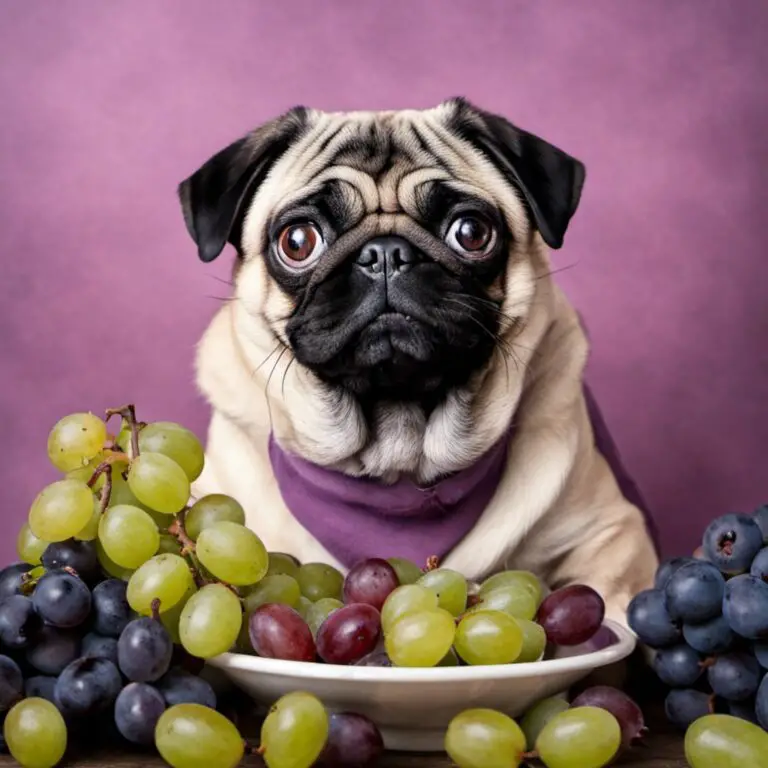Can Pugs Eat Corn? A Comprehensive Guide
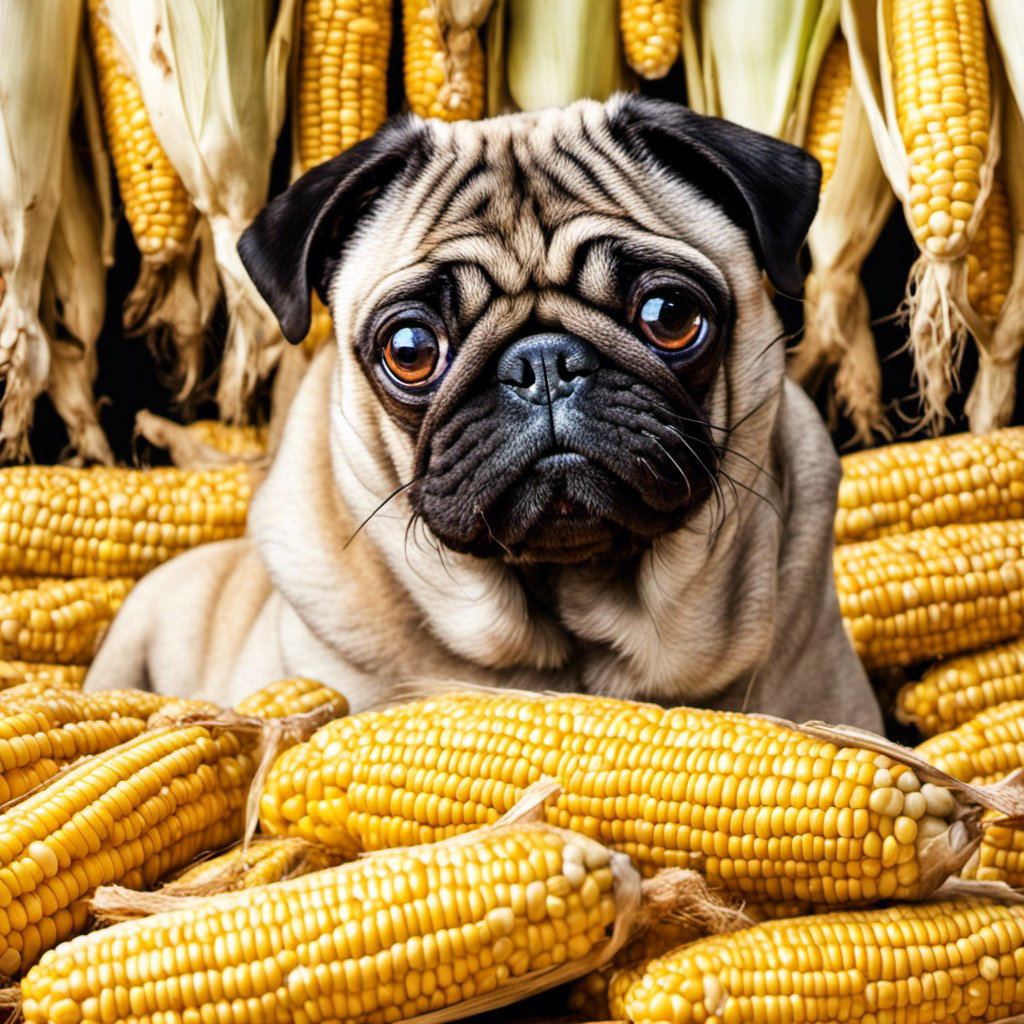
Pugs, like other dog breeds, may have specific dietary needs and restrictions to keep them healthy. As a pet owner, you might wonder if certain foods are safe for your pug to consume. One such food is corn, a common ingredient in various dog foods and a staple in human diets. Can Pugs Eat Corn?
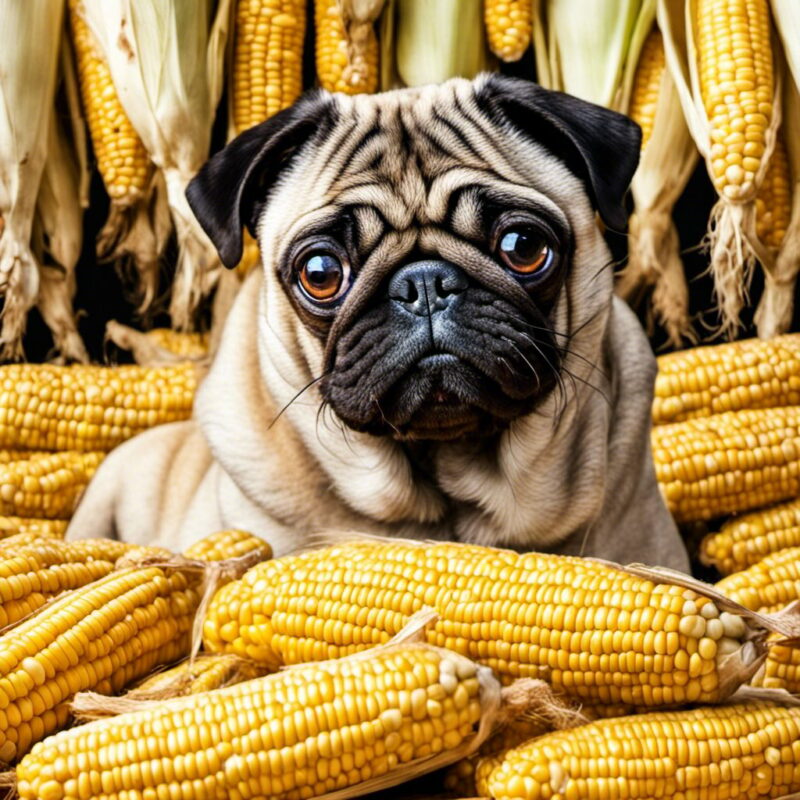
The good news is that pugs can safely eat corn, as it provides nutritional benefits such as protein, carbohydrates, linoleic acid, and antioxidants source. However, knowing the proper form and quantity of corn your pug can consume is essential to ensure their well-being.
Contents
Table of Contents
Understanding a Pug’s Dietary Needs
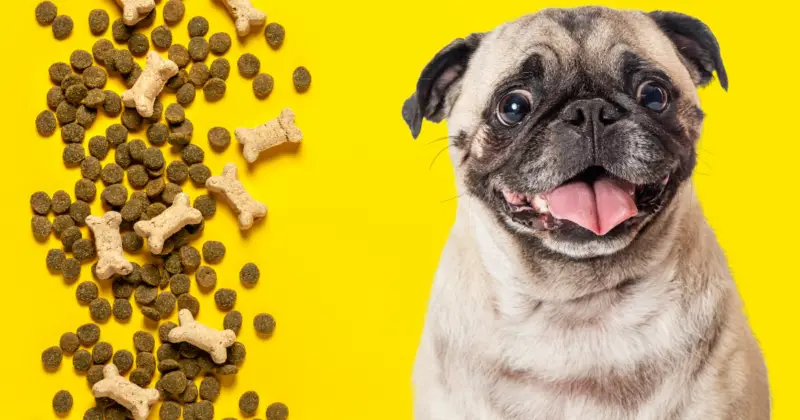
A well-balanced diet is essential for a pug’s overall health. Providing them with the appropriate nutrients in the right quantities ensures they maintain a healthy weight, have a shiny coat, and stay energetic. Like all dogs, Pugs require a diet rich in protein, vitamins, and minerals. Feeding them high-quality dog foods that cater to their specific needs is important.
Protein is a crucial component in a dog’s diet, as it helps in building and repairing tissues. Dog foods made with high-quality protein sources, such as chicken, beef, or fish, are ideal for pugs. These protein sources provide the essential amino acids needed for their well-being.
Get The Free Food Eating Guide That Keeps My Pug Happy and Playful Even at 13 Years Old
100% Beginner Friendly & Lists Real Foods Your Pug Can Actually Eat!
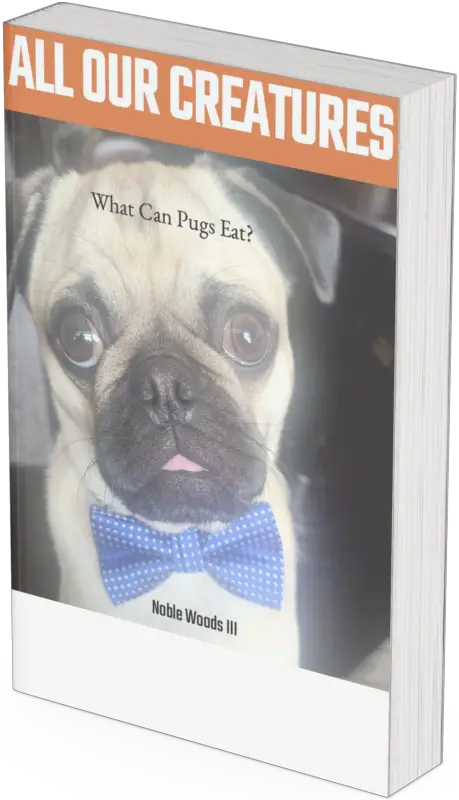
Vitamins and minerals are also vital in a pug’s diet. They play key roles in maintaining their immune system, vision, and bone health. Vitamins such as vitamin A are particularly important for pugs, as they support healthy skin and coat. Including dog foods that have proper amounts of vitamins and minerals are necessary to ensure optimal development.
High-fiber foods can also benefit a pug, as they aid in digestion and help maintain a healthy weight. Foods that are high in fiber, such as vegetables and certain fruits, can be incorporated into their diet in moderation.
It is important to consider the quantity of calories, fat, and carbohydrates that a pug consumes. On average, a pug needs about 25-30 calories per pound of body weight per day. Monitoring their calorie intake can prevent obesity, a common issue in this breed.
The fat content in a pug’s diet should also be monitored, as excessive fat can lead to health issues such as pancreatitis. Lastly, carbohydrates should be present in their diet, but not in excessive amounts, as they can contribute to weight gain and other health problems.
In order to maintain a healthy diet for your pug, ensure that the dog food you choose contains all the essential nutrients – protein, vitamins, minerals, and fiber. Avoid feeding them foods high in cholesterol or those which are toxic to dogs. Understanding and catering to their dietary needs can give your pug a happy and healthy life.
Corn in a Pug’s Diet
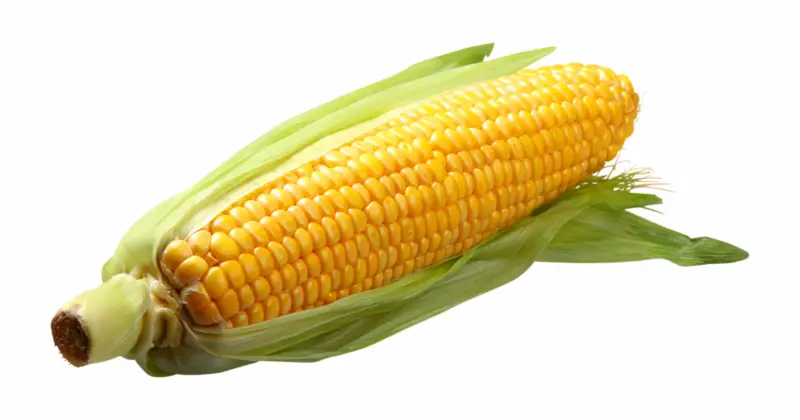
Corn can be a part of a pug’s diet, as it is generally safe for dogs to eat. It provides nutritional benefits such as protein, carbohydrates, linoleic acid, and antioxidants. However, feeding corn to your pug in moderation is important, as with any food.
Feeding your pug fresh corn off the cob is a good option, but make sure to remove the kernels from the cob. Corn kernels are high in fiber, which can promote a healthy digestive system in your dog. On the other hand, avoid giving corn cobs to your pug, as they can present a choking hazard or cause intestinal blockage.
When considering corn’s calorie content, remember that moderation is key. While corn does provide some essential nutrients, it can also contribute to weight gain if consumed in large amounts. Pugs are prone to obesity, so monitoring their calorie intake and ensuring a balanced diet is crucial for their overall health.
Finally, it is essential to remember that every dog is different and has unique dietary needs. If you decide to introduce corn into your pug’s diet, start with small amounts and observe your dog’s reaction. If your pug shows signs of an allergic reaction or digestive discomfort after consuming corn, consult your veterinarian for guidance.
How to Feed Corn to Your Pug
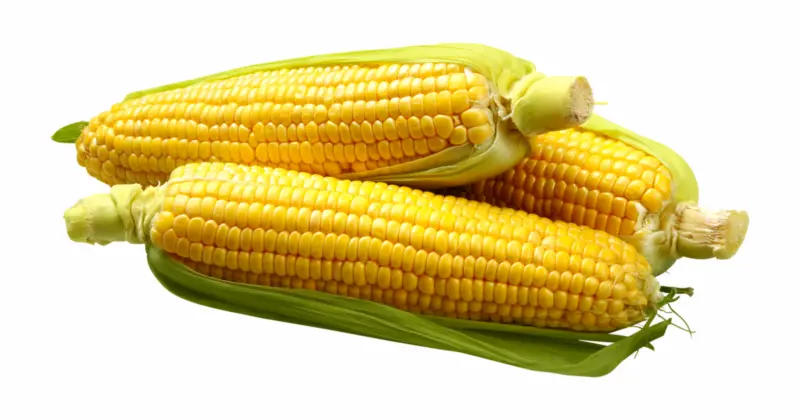
Feeding corn to your pug can be a safe and enjoyable treat in moderation. Corn is a common ingredient in many dog foods, as it provides protein, carbohydrates, linoleic acid, and antioxidants for a well-balanced diet source. However, it’s essential to consider the right way to feed corn to your pug to ensure their safety and enjoyment.
To feed your pug corn as a treat, choose cooked or boiled corn free from salt, butter, and other additives. These added ingredients can be harmful to your pug’s health. Make sure to remove the corn from the cob before offering it to your pet. Since pugs are relatively small dogs, feeding them small amounts of corn at a time is sufficient. A few tablespoons per serving should be adequate for an occasional snack.
As with all treats, corn should be fed in moderation. It’s essential not to overindulge your pug in corn-based snacks, as excess food can lead to health problems over time. Instead, consider offering corn as a reward for good behavior or as a supplement to your pug’s regular diet.
Keep an eye on your pug while they enjoy the corn, and observe them for any signs of distress or discomfort. If your pug has a sensitivity to corn, they may experience issues like indigestion or an allergic reaction. In such cases, it’s best to discontinue feeding corn and consult your veterinarian on alternative treatment options.
In summary, pugs can safely enjoy corn in the proper form and with moderation. This occasional treat can provide nutritional benefits while keeping your pug engaged and happy. Stick to simple, prepared corn without additional ingredients, and remember to prioritize your pug’s overall diet and well-being for the best results.
Benefits of Corn for Pugs
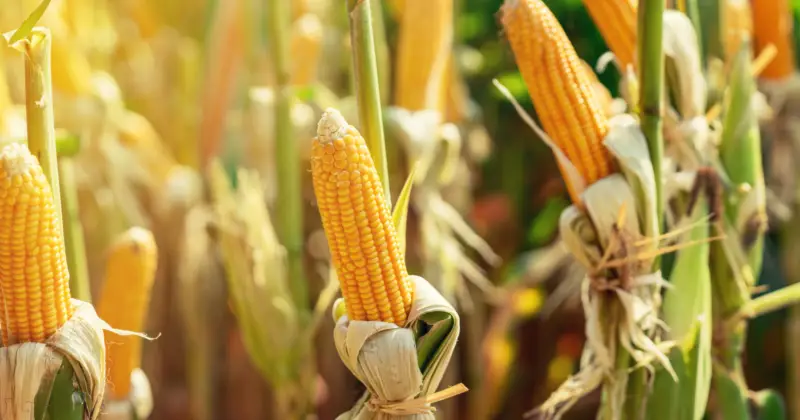
Corn can be a beneficial ingredient in your pug’s diet, as it provides a range of essential nutrients. It is a good source of protein, carbohydrates, linoleic acid, and antioxidants, which can contribute to your pug’s overall health.
The fiber content in corn can help support your pug’s digestive system, ensuring that their body efficiently processes the food they consume. Adding fiber to their diet can help maintain healthy bowel movements and prevent constipation.
Antioxidants in corn help protect your pug’s cells from damage caused by free radicals. These free radicals can lead to various health issues in dogs, such as inflammation and age-related diseases. By consuming corn, the antioxidants will contribute to your pug’s immune system and overall health.
Corn also contains essential vitamins and minerals that contribute to your pug’s well-being. These nutrients are vital for maintaining proper bodily functions, such as cell metabolism, bone development, and maintaining a healthy coat.
Furthermore, corn provides energy for your pug, which is essential for their active lifestyle. Carbohydrates found in corn are a primary source of energy that helps fuel your pug’s daily activities and maintain their stamina.
In summary, incorporating corn into your pug’s diet can offer several benefits, such as providing essential nutrients, supporting their digestive system, and supplying them with energy for an active lifestyle.
Can Pugs Eat Corn? Watch this
Potential Risks of Corn
Corn can be a controversial food item for dogs, like pugs. While it has nutritional benefits, such as being a good source of protein and carbohydrates, it is essential to be cautious while sharing this treat with your furry friend. You should be aware of potential risks when feeding corn to your pug.
First, choking is a significant risk associated with corn, especially when fed with the cob still intact. Pugs may attempt to gulp down the corn without properly chewing it, which might lead to blockage or choking hazards. Therefore, always ensure that you remove the corn kernels from the cob before offering them to your pet. Additionally, keep an eye on your dog while it eats, ensuring it chews the kernels properly to minimize choking risks.
Intestinal blockage can also result from consuming corn cob pieces. Pups might accidentally ingest some sections of the cob, leading to blockages and potential complications. This can be a severe issue that requires prompt veterinary attention. Hence, preventing your pug from accessing corn cobs and only offering them the kernels is crucial.
Another concern when feeding corn to your pug is the risk of an allergic reaction. Though corn allergies are relatively uncommon in dogs, it is still possible for your pug to have an adverse response. Symptoms of an allergic reaction include itching, skin irritations, and digestive issues such as diarrhea. If you notice any of these signs after your pug consumes corn, consult your veterinarian immediately.
Corn, when consumed in large quantities, may cause an upset stomach and diarrhea in some dogs. Therefore, moderation is key when offering corn to your pug. Small portions should be provided to prevent any digestive discomfort.
Lastly, corn should not be a primary component of your pug’s diet since it may contribute to obesity. Like any other treat, corn should be fed sparingly to maintain your pet’s balanced and healthy diet. Pugs are already prone to obesity, so pet owners should be mindful of the calorie content in their dog’s food and treats.
In summary, while corn can be a safe and nutritious treat for your pug when fed appropriately, it is crucial to consider the potential risks. Ensure your pet’s safety by removing the kernels from the cob, monitoring its consumption, and providing corn in moderation.
Other Safe and Healthy Foods for Pugs
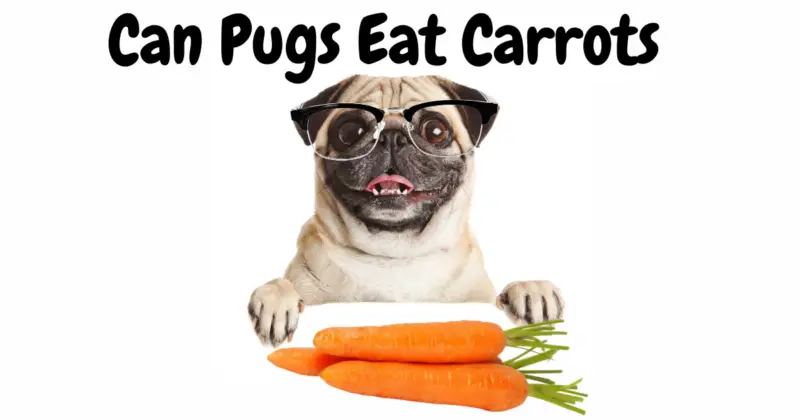
Pugs can enjoy a variety of fruits and vegetables as part of their diet, providing them with essential vitamins and minerals. Some examples of safe fruits for pugs include blueberries, mangoes, peaches, watermelon, raspberries, cantaloupe, and oranges. These fruits are high in vitamins, fiber, and antioxidants, making them a healthy choice for your pug. However, removing any seeds and serving the fruits in moderation is essential, as too much can cause digestive issues or weight gain.
One particularly beneficial vegetable for pugs is carrots. They are high in fiber and beta-carotene, which is excellent for their overall health. However, it is crucial to feed carrots in moderation, not large quantities, due to their high fiber content.
Other vegetables like broccoli, peas, and green beans are also safe for pugs and can provide essential nutrients. These veggies can be mixed with their regular dog food or served occasionally as a treat. Additionally, make sure to serve vegetables in small and soft pieces to avoid choking hazards.
When it comes to meat, pugs can benefit from consuming lean protein sources like salmon, chicken, and turkey. These meats are lower in fat content and provide essential nutrients like magnesium and potassium. Avoid fatty cuts of meat, as they can lead to health issues for your pug.
Dog treats specially formulated for pugs, such as Royal Canin Breed Health Nutrition Pug Dry Dog Food, can be fed to your pug in moderation. This type of food contains tailored nutrition for their specific needs and features kibble designed to be easy for their short, blunt, and square noses to pick up.
In conclusion, there are numerous safe and nutritious fruits, vegetables, and snacks for your pug to enjoy. As a responsible pet owner, always be cautious about the amount and type of food you provide to your pug, ensuring they maintain a well-balanced diet to stay healthy and happy.
Foods to Avoid for Pugs
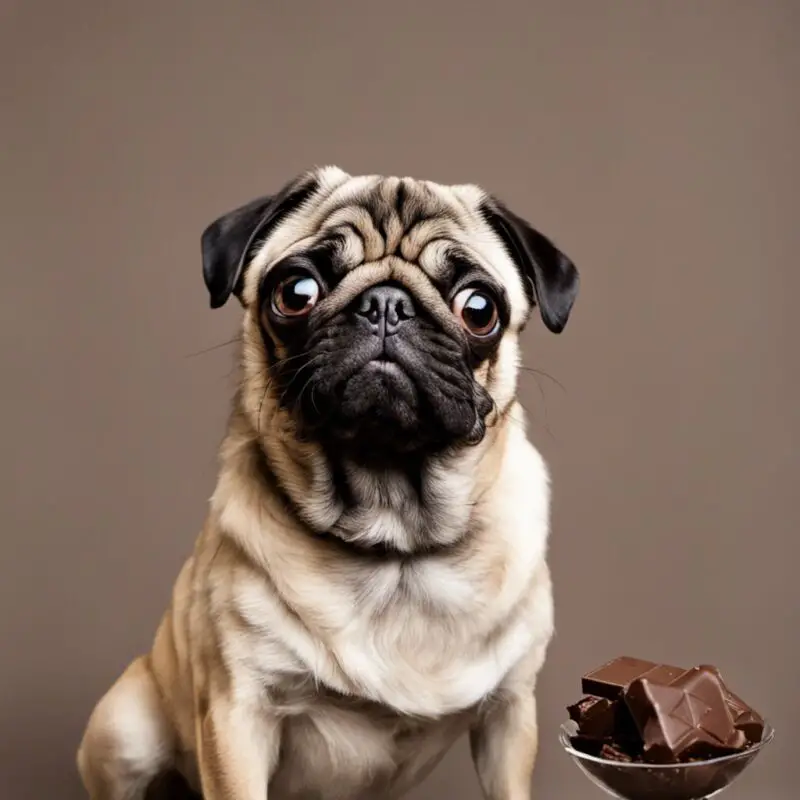
When caring for your pug, it’s crucial to be aware of the foods that are safe and those that can be dangerous for them. Some foods, like corn, can be harmless in small quantities, but others can pose threats to their health.
One harmful food for pugs is chocolate, as it contains a compound called theobromine, which is toxic to dogs. The smaller the dog, the more significant the potential damage from ingesting chocolate.
Pugs should also not be given onions or garlic as they contain compounds that can damage their red blood cells, leading to anemia. Ingesting even a small amount of these vegetables can be harmful to your pug.
Another toxic food for pugs is grapes and raisins. These fruits can cause rapid kidney failure in dogs, and symptoms like vomiting, diarrhea, and lethargy can appear within hours of consumption.
Avocado is another food to avoid, as it contains a toxin called persin that can cause vomiting and diarrhea in dogs. The fruit and avocado seeds, leaves, and bark are harmful to pugs.
Fruits like cherries and their cores are also dangerous for pugs. The seeds stems, and leaves of cherries contain cyanide, which can cause poisoning in dogs if ingested in significant amounts.
Xylitol, an artificial sweetener often found in sugar-free gum and candies, can cause a rapid insulin release leading to hypoglycemia in dogs. This condition can be life-threatening, so keep products containing xylitol away from your pug.
Caffeine and macadamia nuts must be avoided, as they can cause toxicity in dogs. Symptoms of poisoning from these substances may include tremors, vomiting, and elevated heart rate.
Raw fish and mushrooms are also not recommended for pugs. Raw fish can contain harmful bacteria and parasites, while some mushrooms can be toxic, leading to severe poisoning in dogs.
Lastly, it is not advisable to give your pug popcorn, as the kernels can pose a choking hazard, and the high sodium content can be detrimental to their health.
Being aware of these toxic and harmful foods is essential for your pug’s safety. Ensure that you provide them with a balanced diet and avoid giving them foods that can put their health at risk.
Reading Dog Food Labels
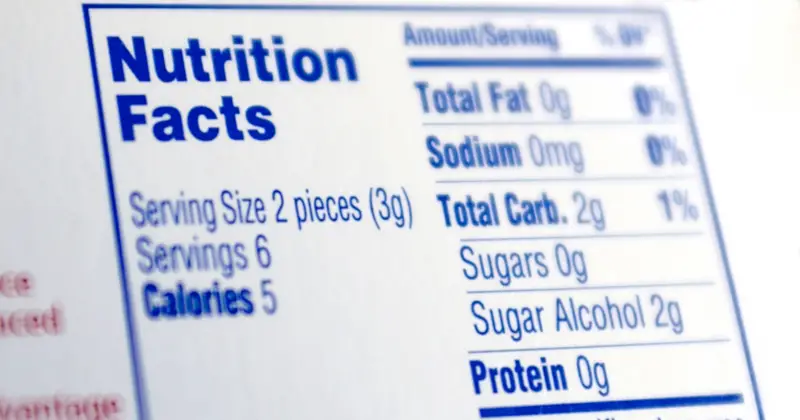
When choosing dog foods for your pug, it’s essential to read the labels carefully. This will help you ensure that the food is safe, nutritious, and free from unhealthy ingredients. Labels often include information about calories, fat, vitamins, minerals, carbohydrates, sugar content, protein, fiber, cholesterol, and whether the food is organic or not.
When examining dog food labels, first start by looking at the ingredients list. The ingredients should be listed in descending order of weight, with the first ingredient being the most abundant. Make sure that the food contains a high-quality protein source, such as chicken, beef, or salmon. Avoid foods that list by-products or fillers as the main ingredients.
Next, check the nutritional content of the dog food. This includes the amount of protein, fat, carbohydrates, and fiber. It’s essential to ensure that the food provides a balanced diet for your pug. For instance, it should contain enough protein for muscle development and maintenance and an appropriate amount of fat to provide energy and support overall health. Also, pay attention to the levels of vitamins and minerals to help support your pug’s immune system and overall well-being.
Keep an eye on the sugar content and avoid dog foods with excess sugar. High sugar intake may lead to obesity, dental issues, and other health problems. Similarly, checking the cholesterol levels on the label is also crucial, especially if your pug is prone to weight gain or heart issues.
One aspect that many pet owners look for is whether the food is organic or not. Organic dog foods are made from ingredients that are grown without pesticides, synthetic fertilizers, or chemicals, which can support your dog’s overall health. Organic livestock used in dog food are also treated better and not given growth hormones or antibiotics.
By carefully reading dog food labels and understanding the ingredients and nutrients they contain, you can ensure that you’re providing your pug with a safe and healthy diet.
When to Consult a Vet
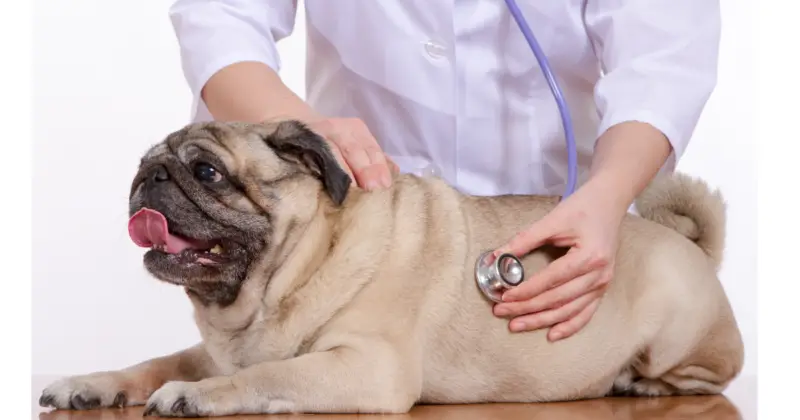
If your pug has eaten corn and starts to show unusual symptoms, it’s essential to consult your veterinarian as soon as possible. Some common signs that your pug may be experiencing an issue include diarrhea, vomiting, and lethargy. While corn is generally considered safe for dogs, some individuals might have an undiagnosed allergy or intolerance to it.
Moreover, if you suspect that your pug has ingested a large amount of corn on the cob, you should also contact your vet immediately. The cob can cause intestinal blockages, which require urgent attention.
In addition to digestive issues, it’s important to monitor your dog for symptoms of more serious health concerns. Kidney failure and poisoning are rare but potentially life-threatening conditions for dogs. Signs of kidney failure may include:
- Increased thirst and urination
- Loss of appetite
- Weight loss
- Weakness
- Pale gums
If your pug displays any of these symptoms, seek veterinary care immediately.
Being observant and proactive when it comes to your pug’s health will help ensure any serious problems are addressed promptly. Make sure to consult your vet when your dog displays unusual symptoms or behaviors, especially if they involve changes in appetite, energy levels, or gastrointestinal function.
A confident, knowledgeable, and neutral approach to your dog’s health concerns will ultimately benefit both you and your furry companion.
FAQs: Can Pugs Eat Corn

Can pugs safely consume cooked corn?
Yes, pugs can safely consume cooked corn in moderation. Cooked corn can be a nutritious addition to your pug’s diet, as it is a good source of protein and carbohydrates.
Are corn kernels okay for pugs to eat?
Corn kernels are generally okay for pugs to eat, as they are safe for canine consumption and can provide some nutritional benefits. Just make sure to feed them in moderation and avoid adding any unhealthy seasonings or toppings.
Is canned corn safe for pugs?
Canned corn can be safe for pugs if it is plain and free of added salt or preservatives. However, it’s essential to drain and rinse the canned corn to remove excess sodium before feeding it to your pug. Fresh or frozen corn is a healthier option compared to canned corn.
What should I do if my pug eats a corn cob?
If your pug eats a corn cob, consult your veterinarian immediately. Corn cobs can cause blockages in the digestive tract, which could require emergency surgery. It’s essential to keep corn cobs out of your pug’s reach.
Can pugs eat other vegetables like peas and carrots?
Yes, pugs can eat other vegetables like peas and carrots. These vegetables can be a healthy addition to your pug’s diet, providing essential nutrients and fiber. Just like corn, feed these vegetables in moderation and avoid adding unhealthy seasonings or toppings.
Is frozen corn a suitable treat for pugs?
Frozen corn can be suitable for pugs, especially during hot weather. Just make sure to feed it in moderation and avoid giving your pug large amounts, which could lead to digestive issues.

